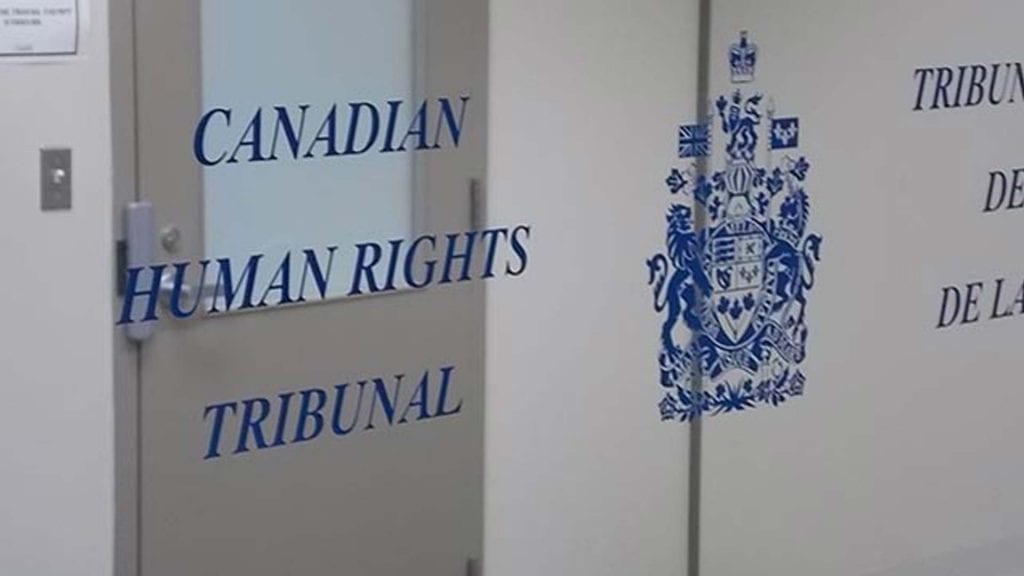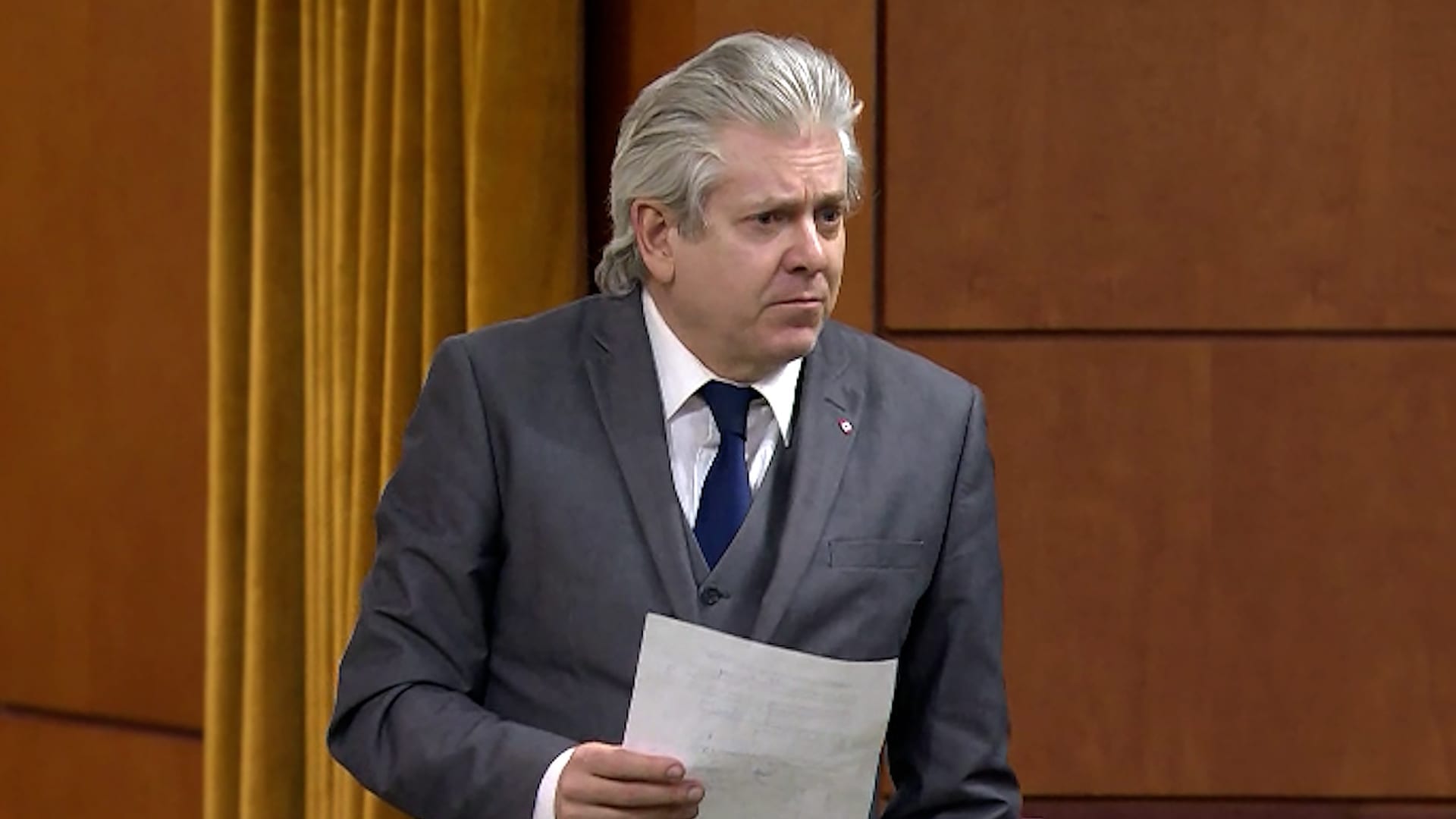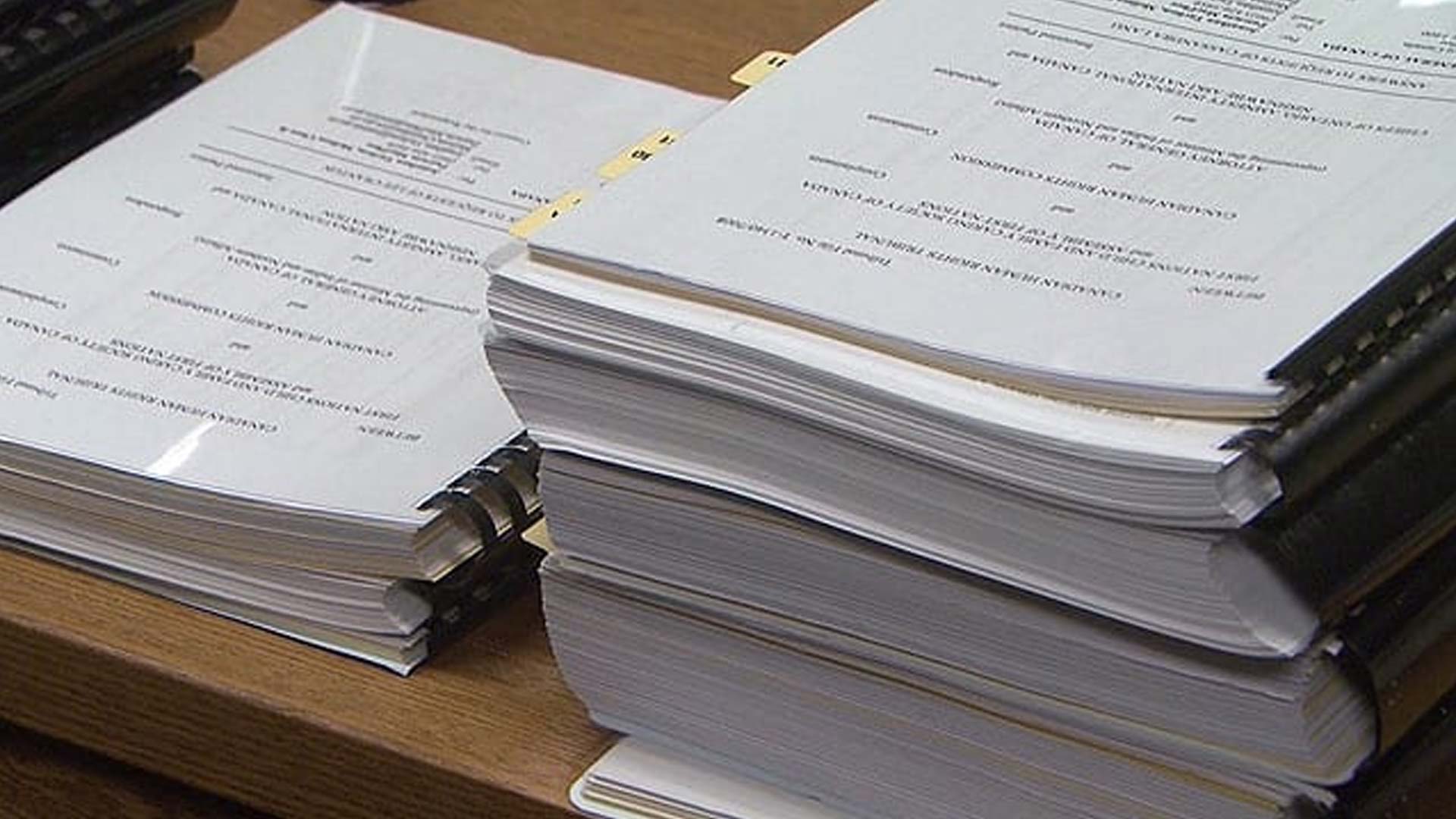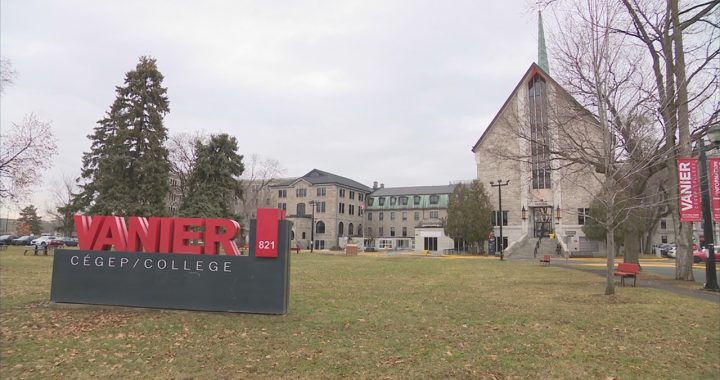
The entrance to the Canadian Human Rights Tribunal hearing room in Ottawa. Photo: APTN file
It could cost Canada $15 billion to comply with a 2019 Canadian Human Rights Tribunal order awarding damages to First Nations families harmed by the state’s racial discrimination against kids, according to a costing estimate prepared by the Parliamentary Budget Officer (PBO).
“This is an extraordinary amount of money,” NDP MP Charlie Angus said Tuesday morning. “But I think what we really, really need to keep in mind here is that the real cost has been paid in the lives of Indigenous children on reserves across this country.”
In 2016, the tribunal ruled Canada purposefully and knowingly underfunds child and family services on reserves across the country and in the Yukon, creating what has been called a “perverse incentive” to apprehend kids and place them in foster care.
Based on the “wilful and reckless” nature of the conduct, the tribunal awarded maximum compensation of $40,000 to each child and some family members who suffered. The order includes kids who were denied services under Jordan’s Principle.
PBO Yves Giroux told APTN News his office reached the staggering sum based on a reading of a plan to distribute those payments, which the tribunal approved on Feb. 12.
The parties in the tribunal litigation, he explained, have agreed upon a payment plan that is broader than what the tribunal ordered.
“It’s an astronomical amount because of the number of children and their family members who are covered under the orders,” he said.
“If we were to go with the strict interpretation of the tribunal’s order, we estimate there would be about 33,000 individuals who would be eligible under the Jordan’s Principle compensation. Whereas the parties themselves, with that broader interpretation, they would have 250,000 persons covered. So that’s why it increases the cost significantly.”

The PBO is an independent financial analyst who prepared this report at Angus’s request. Giroux’s office already estimated the cost of complying with the tribunal order last year.
The analysts used a stricter interpretation than the one presented to the tribunal, however. The initial estimate pegged the cost of complying with the order at between $900 million and $2.9 billion.
But that report didn’t factor in the Jordan’s Principle claimants. The latest analysis said the total figure would rise to between $2.2 billion and $4.2 billion once Jordan’s Principle compensation is factored in.
This lower figure is again based on the PBO’s own strict interpretation and not the one presented to the tribunal in the payment plan.
A senior civil servant at Indigenous Services Canada (ISC) estimated in 2019 it could cost between $5 billion and $6 billion to comply with the order and potentially rise to $8 billion if the compensation process drags on into 2025-26.
The new report points out that ISC’s initial liability estimate also did not include the Jordan’s Principle element of the order.
The report said the numbers are presented with “extreme uncertainty” due to ISC’s lack of high-quality data.
Read More:
Report says compensating First Nations kids in care would cost billions less than predicted
Compensation for the delay and denial of services to First Nations children
The ongoing legal battle at the tribunal began in 2007 when the First Nations Child and Family Caring Society and the Assembly of First Nations brought the human rights complaint forward.
Hearings began in 2013 after numerous attempts by Ottawa to have the case tossed out. Canada continues to challenge some but not all tribunal rulings.
In 2016, the tribunal issued a landmark decision ruling the Canadian state was, and is, racially discriminating against First Nations kids. It ordered Canada to halt this discriminatory behaviour and immediately reform.
The parties in the tribunal litigation were ordered to come up with a framework for distributing payment as part of the 2019 compensation order.
But Canada challenged that ruling, filing for a judicial review in Federal Court to have the order quashed. This judicial review is pending.
In a preliminary hearing, however, the feds asked the court to pause the tribunal’s compensation order but were unsuccessful.
This means they had to come up with the compensation framework. It was using this framework that the budget office came up with the sum of $15 billion.
Angus said Ottawa’s refusal to immediately undertake the required reforms has drawn out the litigation and resulted in higher costs.
“That’s easily $10 billion more than if Justin Trudeau had done the right thing and tried to make it right by First Nation children in the first place,” he said.
“We wouldn’t be looking at this situation now and we also may not be looking at the multiple class-action lawsuits that are pending [against] the government.”
Two class actions dealing with these issues have recently combined into one and are undergoing mediation by a retired First Nations judge.

The tribunal is a quasi-judicial body with a mandate to administer the Canadian Human Rights Act. It can award damages under that legislation and craft remedies to correct discrimination where it occurs.
Canada’s lawyers argue the tribunal overstepped this statutory authority. They point out the damage award is not flexible, awarding the same $40,000 to everyone regardless of their situation.
Minister Marc Miller has repeatedly said Ottawa is committed to compensating but would prefer to do it through a class action.
Canada has now settled three broad class actions dealing with what it calls “Indigenous childhood claims litigation.”
But the tribunal made the right call, said Angus, and Canada should pay what’s owed.
“They want to put children on the stand just like they did to their grandparents and force them to testify whether or not they suffered this amount of abuse or that amount of abuse and let the government and the Justice Department lawyers set up their little boxes as to whether those children deserve it,” said Angus.
“The human rights tribunal rightly said, ‘No this is wrong: Your refusal to negotiate, your refusal to even admit that there is ongoing discrimination has resulted in the tribunal being forced to issue the maximum penalty for racist discrimination that’s available in Canada.’ And that is what the government has to pay.”
Miller responded to Angus in question period Tuesday afternoon.
“This government is unequivocally committed to addressing the longstanding unmet needs of First Nations children and resolving these cases,” said Miller.
“We are continuing our mediation with the CHRT partners, two other class-action partners to the complaints, First Nations partners, provinces and territories to ensure that we fully implement Jordan’s Principle and resolve this wrong.”










